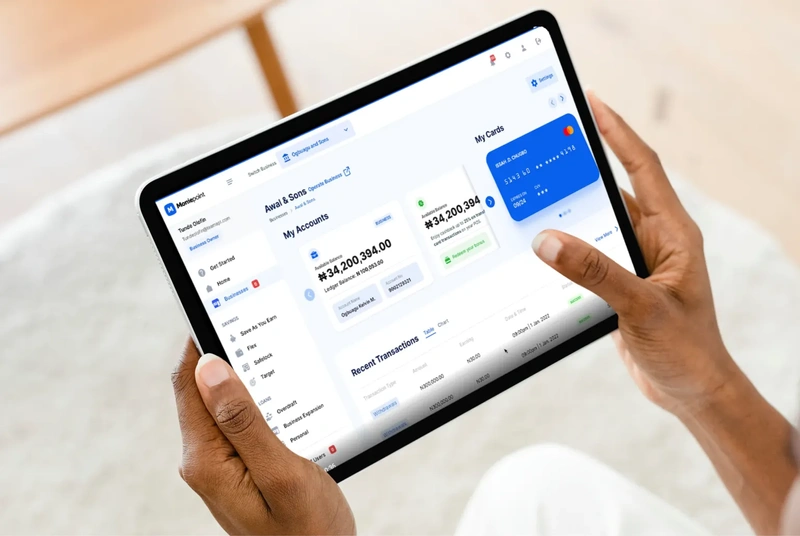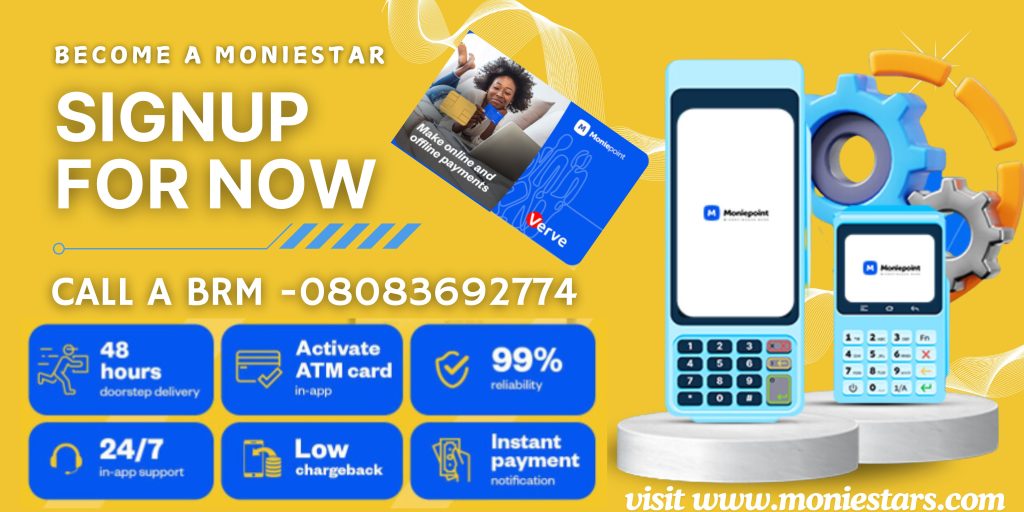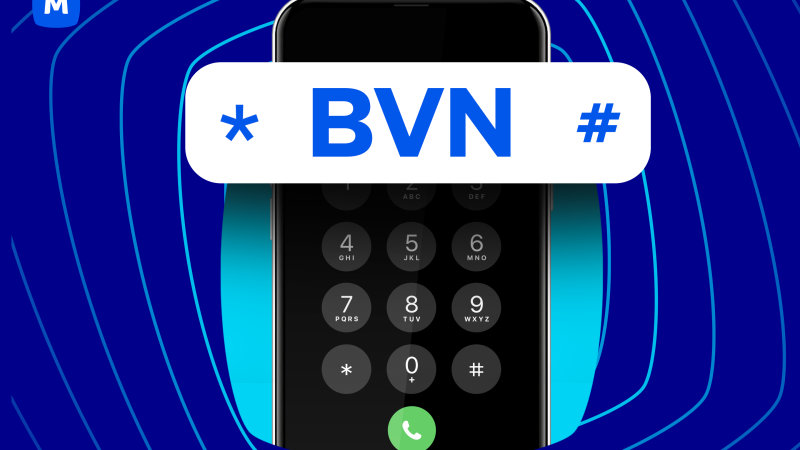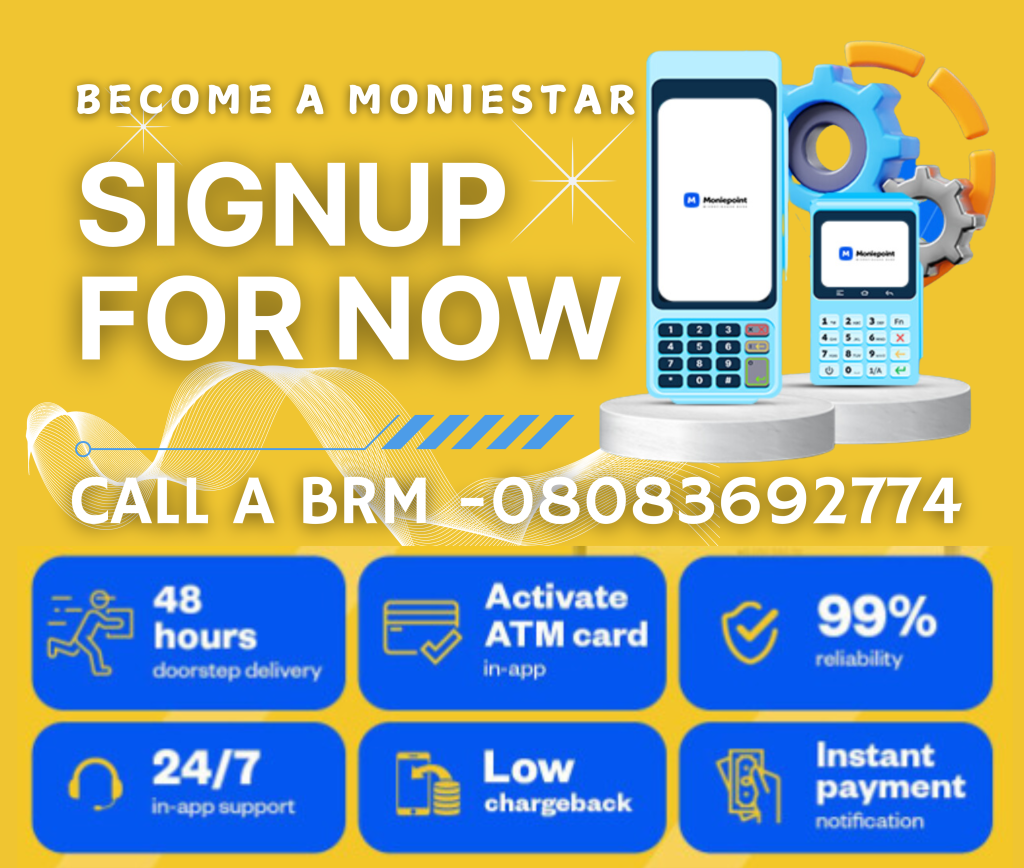Becoming A Business Owner
To Become A Moniestar, You Need To Open A Moniepoint Business Account.
Starting a business is the first step in actualising your dreams of financial freedom and becoming a household name that’s popular for providing your preferred product or service.
Yet without the right tools, no matter how much time or money you put into your business, you could end up back where you started, merely dreaming.
Of all the tools you need to make your dreams a reality, not many are as important as a business account.

What Is A Business Bank Account?
A business bank account is a type of account that companies, organizations, or individuals use to manage their financial transactions and activities.
This type of account is typically separate from personal accounts and is used for managing revenue, expenses, and other financial transactions related to running a business.
Some examples of transactions that can be made using a business account include accepting customer payments, paying bills and expenses, and transferring funds between accounts.
You can open a business account at most banks and financial institutions, and they may offer additional features such as online banking, check writing, and debit/credit cards.
What Are The Types of Business Accounts?
In Nigeria, some types of business bank accounts that banks offer include
1: Current account: This is a type of account that is mainly used for day-to-day transactions, such as accepting payments from customers and paying bills and expenses.
2: Savings account: This type of account is designed for businesses that want to save money for short-term or long-term goals.
3: Corporate account: This is a special type of account that is intended for large organizations and companies. It typically requires higher minimum deposits and may offer additional features like check writing and debit/credit cards.
4: Domiciliary account: This type of account allows businesses to hold and transact in foreign currencies, which can be helpful for businesses that trade internationally or have overseas partners.
Benefits of a Business Bank Account
You might wonder, “Why do I need a business account when I already have a personal account with my bank of choice.” Well, a business account offers a myriad of benefits for you and your business. These are:
1. Separation of Personal and Business Finances
Having a different business account helps to keep your personal and business finances separate, which can make it easier to manage your finances and prepare your taxes.
2. Professional Image
Having a business account can give your business a more professional image, which can help to attract customers and build trust with your clients.
3. Access to Banking Services
Business accounts typically offer a range of banking services such as check writing, debit/credit cards, and online banking, making it easier to manage your finances and make transactions.
4. Improved Record-Keeping
Business accounts can make it easier to keep track of your financial transactions, which can be helpful when preparing financial statements and tax returns.
5. Creditworthiness
Having a business account can help demonstrate your business’s creditworthiness, which can be important when seeking loans or other forms of financing.
6. Access to business loans
Some banks offer business loans for small-scale and large-scale businesses. Having a business account with them can make applying for and securing a business loan easier.
7. Enhanced security
Business accounts typically offer enhanced security features to protect your funds, such as fraud detection and protection services.
8. Increased credibility
Having a business account can increase the credibility of your business and help to establish trust with your customers.
Why Open A Moniepoint Business Bank Account?
Opening a Moniepoint bank account for your business is definitely one of the smartest decisions you can make for your business.
Why? you might ask.
It’s because having a business account with us gives you access to the much-needed resources to grow your business.
The best part is you don’t need to queue in a banking hall to open a Moniepoint business account.
Besides that opening, a Moniepoint business account gives you some amazing benefits like:
- Open an account for free
- Get verified within a few minutes.
- No hidden fees
- Complete control over your account
- Round-the-clock business banking support
- Instant notifications
Requirements To Open A Business Bank Account on Moniepoint
“What do I need to open a Moniepoint Business Banking Account number?” Below are what you will require to do so:
- A functional phone number
- An email address you can easily access
- Your BVN or NIN
- A valid Government ID, e.g. International Passport, Driver’s License, and Permanent Voter’s Card. National Identification Number (NIN), Residence/Work Permit (For Foreigners)
- A utility bill to verify your address
Don’t wait! Open your Moniepoint business bank account today. gather the required details above and submit via the link below:

You Might also like
-
The Right Bank for Your Small Business
How to Choose the Right Bank for Your Small Business

As a small business owner, Ade constantly makes choices that shape the success of his venture. From picking a prime location to driving sales and attracting the right foot traffic, every decision counts.
One critical yet often overlooked choice is selecting the right bank—one that offers the services and support needed to ensure smooth cash flow and foster growth.
If you’re a business owner like Ade wondering how to select the best bank for your small business, you’re in the right place. Let’s explore some essential tips and factors to keep in mind when deciding on a business bank account.
8 Tips for Selecting the Best Bank for Your Small Business
1. Understand Your Banking Needs
Before opening a business account, take a moment to evaluate your current situation and your future goals.
Think about what’s most important to your business: Do you need a loan? A business checking account? Robust online banking features? Having a clear sense of your needs will help you choose a bank that aligns with your growth plans.
2. Assess Customer Support
As your business grows, having a bank that provides reliable support is crucial. Evaluate their customer service by asking:
- Do they offer a dedicated relationship manager?
- Is support available 24/7?
- How quickly do they respond to inquiries?
- What are their operational hours?
You’ll want a banking partner you can rely on for guidance in areas like taxation, policies, and financial planning. Checking reviews from other business owners can give you insight into their level of service.
3. Review Service Fees
Banks charge varying fees for services such as transactions, overdrafts, and account management. Comparing these fees across banks can save you money in the long run.
For instance, if your business frequently uses ATMs or debit cards, opt for a bank with low or no fees in these areas. Common charges to watch out for include:
- Account maintenance fees
- ATM charges
- Transaction fees
- Inactivity penalties
- Card processing fees
The goal is to find a cost-effective banking solution that helps you manage expenses.
4. Look for Digital Banking Features
In today’s fast-paced world, being able to manage your business finances online is a must. Many banks now offer digital tools that let you handle transactions, monitor balances, pay employees, and settle bills—all from your mobile device.
Choose a bank with a user-friendly app and online platform that makes managing your finances convenient and seamless.
5. Prioritize Security and Fraud Protection
Security is non-negotiable when it comes to business banking. Opt for a bank that prioritizes safety with features like multi-factor authentication, real-time notifications, encryption, and biometrics. This ensures you can focus on your business with peace of mind.
6. Evaluate Incentives and Perks
A good bank should provide essential services such as business accounts, debit cards, and cash management tools. But some go the extra mile by offering perks like low-interest savings accounts, free consultations, or business dashboards.
Take the time to understand these offers and any associated costs before committing.
7. Access to Credit and Loans
Expanding your business often requires capital, so it’s important to choose a bank that provides easy access to credit. Look for a bank with a fair and transparent loan process tailored to your business needs.
Banks like Moniepoint MFB, for example, analyze the financial histories of their clients to offer credit that suits their specific requirements.
8. Convenience Matters
Managing a business is demanding, so convenience is key when choosing a bank. Whether you prefer digital banking or traditional in-branch services, ensure the bank fits your lifestyle.
If you frequently travel, pick a bank with widespread branches or online options to ensure seamless access wherever you are.
Enhance Your Business Banking with Moniepoint
Choosing the right bank can significantly impact the growth and efficiency of your business. The ideal bank should offer dependable customer service, streamlined transaction options, secure accounts, and other essential tools to keep your operations running smoothly.
At Moniepoint, we’re proud to partner with over two million businesses, providing access to credit, business accounts, secure debit cards, POS terminals, and more. Join us today to experience banking tailored to your business needs, anytime, anywhere.
Post Views: 121 -
How to Check your Bank Verification Number
The Big Oxmox advised her not to do so, because there were thousands of bad Commas, wild Question.
-
5 Black Friday Strategies
Creative Black Friday Ideas for Small Businesses in 2024

Black Friday has become a global shopping phenomenon, with consumers spending a staggering $211.7 billion during the season in 2022. For small businesses, this is more than just a sales event—it’s a chance to capture the attention of new customers and build loyalty.
But success on Black Friday isn’t automatic. It takes more than discounts and promos to make an impact. A fast, reliable payment system and thoughtful marketing strategies are key to standing out in the crowd.
Here are five innovative ways to make Black Friday 2024 a profitable event for your business. But first, let’s touch on the history behind this shopping extravaganza.
Where Did Black Friday and Cyber Monday Begin?
The origins of Black Friday are steeped in various stories. One of the most popular explanations ties the term “black” to financial ledgers: retailers would go from losses (red ink) to profits (black ink) after Thanksgiving.
Another historical perspective traces Black Friday back to the 1950s in Philadelphia, where the day after Thanksgiving caused significant traffic congestion as shoppers flooded the city for the Army-Navy football game.
In the modern retail landscape, Black Friday refers to the Friday following Thanksgiving (November 29 in 2024), kicking off a weekend of deals that culminate in Cyber Monday, a day dedicated to online shopping.
5 Black Friday Strategies to Try This Year
1. Spark Engagement with a Contest
Contests are a fantastic way to connect with your audience while promoting your brand. You could create a simple social media challenge—ask customers to share creative ways they would use a product from your store.
Encourage participants to tag friends and engage with your page. Offer a free product or service as a prize. Not only does this build excitement, but it also drives traffic and boosts your online presence.
2. Introduce Limited-Time Deals
Time-limited offers play on the natural fear of missing out (FOMO), making them highly effective. Here’s how you can use time-based promotions to your advantage:
- Exclusive early bird discounts: Reward early shoppers with special deals to create buzz.
- Hourly sales: Keep customers coming back by introducing new discounts at different hours.
- Daily countdowns: Build momentum by offering unique deals in the days leading up to Black Friday.
- Last-minute steals: Tempt late shoppers with final offers as the clock winds down.
Use social media, email, and website banners to promote these deals with a sense of urgency.
3. Maximize Impact with Email Marketing
Email marketing is a powerful tool for Black Friday promotions. Send targeted campaigns to your subscribers featuring your best deals, gift ideas, and exclusive discounts.
Keep your emails visually appealing and include clear calls-to-action, directing recipients to shop with just a click.
4. Give Shoppers a Little Extra
Adding a freebie to each purchase is a simple yet effective way to encourage buying. Options like surprise gifts, sample products, or small complimentary items can create memorable shopping experiences.
You could also let customers choose their gift from a curated selection to make the incentive feel more personal.
5. Make Checkout Hassle-Free
A surge in Black Friday transactions can put strain on payment systems, leading to delays and frustrated customers. Offering fast, secure payment options is critical to ensuring a seamless shopping experience.
Consider tools like point-of-sale (POS) systems and reliable online payment solutions. By streamlining the checkout process, you’ll stand out from competitors who might struggle with transaction bottlenecks.
Wrapping Up
For small businesses, Black Friday is a chance to get creative and connect with customers in meaningful ways. Whether it’s through interactive contests, limited-time offers, or thoughtful customer incentives, the key is to experiment and find what resonates most with your audience.
And don’t forget—having a reliable payment solution in place can make all the difference during this busy shopping season.
Start preparing now to make Black Friday 2024 a standout event for your business!
Post Views: 109


